When you hear about stress, you often think about adults and the rigors of daily life. You may think about common adult problems that can become serious stressors. These include family, career, health, finances, relationships, and many others. However, did you know that children's health can also be negatively affected by stress? In fact, its consequences can follow these children into adulthood. Children may also not be able to cope with stress due to an existing adrenal condition. In this case, their quality of life would be impacted unless they receive proper intervention as soon as possible.
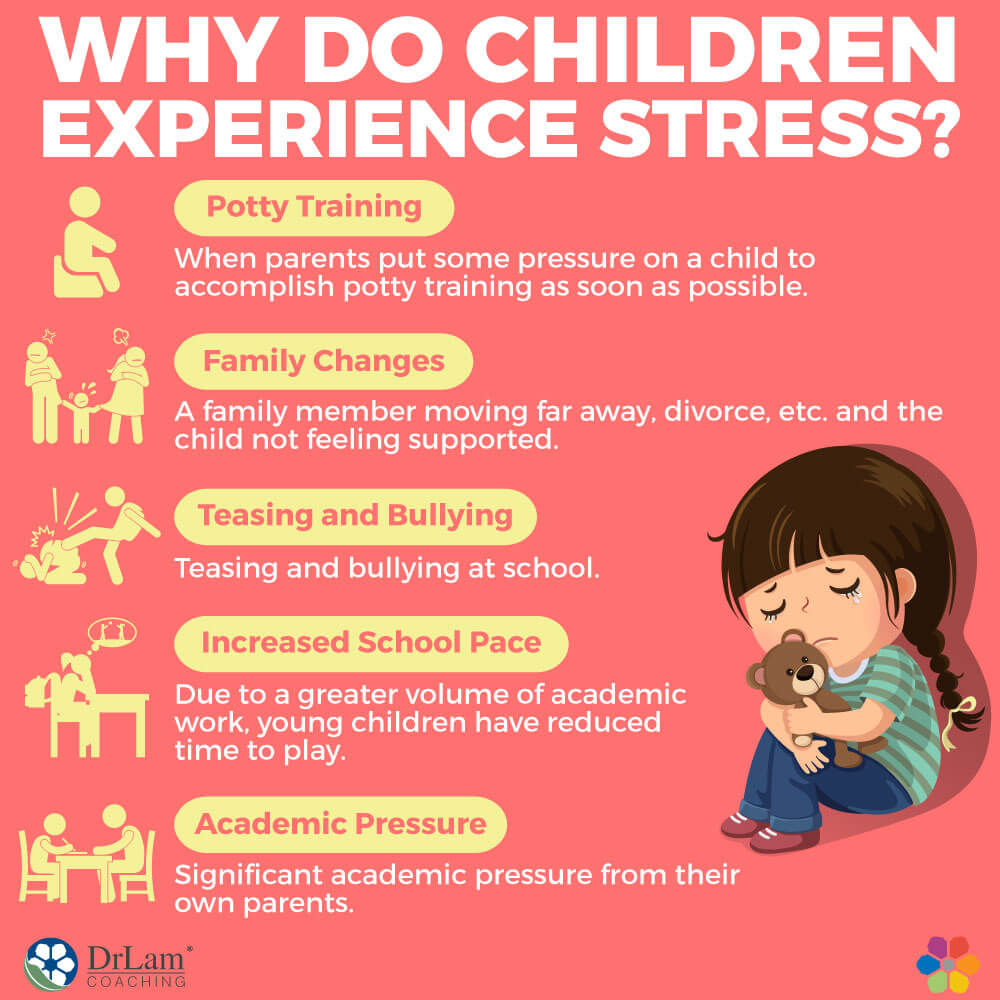
When you hear about stress, you don't necessarily think of children. In fact, you may not even be aware that stress is also a problem that affects children's health. In general, children are seen as carefree, outgoing, and inquisitive. They are excited to discover new things and have new experiences. They take delight in play and making friends. However, children can still suffer from stress.
Experts have identified several common sources of stress among children. These include:
For many parents, potty training represents an important milestone. When a child has been successfully potty trained, it means that they have transitioned to another stage in development.
Unfortunately, not all children are able to go through potty training successfully. Because of this, parents may become frustrated and upset. As a result, they might put some pressure on the child to accomplish potty training as soon as possible. When parents do this, a child may feel frustrated.
Once you bring a child into the world, you eventually introduce him or her to your social circle. This usually includes your immediate family and possibly, other relatives. Furthermore, you reinforce your child's relationship with various family members by making sure they get to interact with each other fairly often. This might be during the weekends, family celebrations, and holidays.
However, in some cases, family dynamics and relationships may undergo sudden changes. This can be due to a family member moving far away. On the other hand, a divorce between a child's parents can also abruptly change a child's relationship with various family members. These changes can make them experience stress just like adults in the same situations.
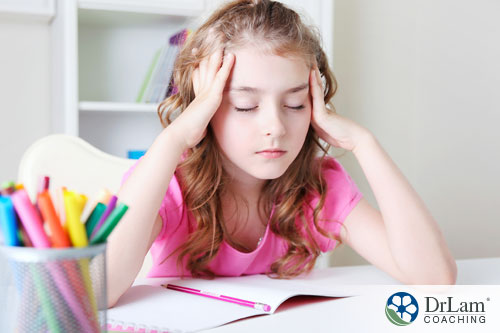 Once a child reaches a certain age, he or she eventually attends school. Education is necessary for empowering a child's mind and skills. At the same time, it is also a great way to ensure that the child has a better future.
Once a child reaches a certain age, he or she eventually attends school. Education is necessary for empowering a child's mind and skills. At the same time, it is also a great way to ensure that the child has a better future.
While at school, a child is exposed to other children. Generally, children get along and happily interact with others. However, there are certain children who also experience teasing and bullying at school. This affects their emotional health and causes them to become stressed.
A child's education progresses at a much faster pace in modern times. Experts have found that children in kindergarten tend to be subject to relatively more homework. Meanwhile, first and second graders are also given more homework today than in previous years. In addition, the time that schools spend on physical education, music, and art has also decreased significantly.
Due to a greater volume of academic work, young children have reduced time to play. This means that they also don't have many opportunities to relax from school work.
Aside from having to deal with more school work, children may also face significant academic pressure from their own parents. Generally, parents want their children to do well in school and receive good grades in every subject.
In some cases, parents would communicate academic expectations to their children. The hope is that this would motivate a child to study harder and do better at school. However, what parents don't realize is that this also puts pressure on their child. As a result, the thought of performing less than expected causes significant stress.
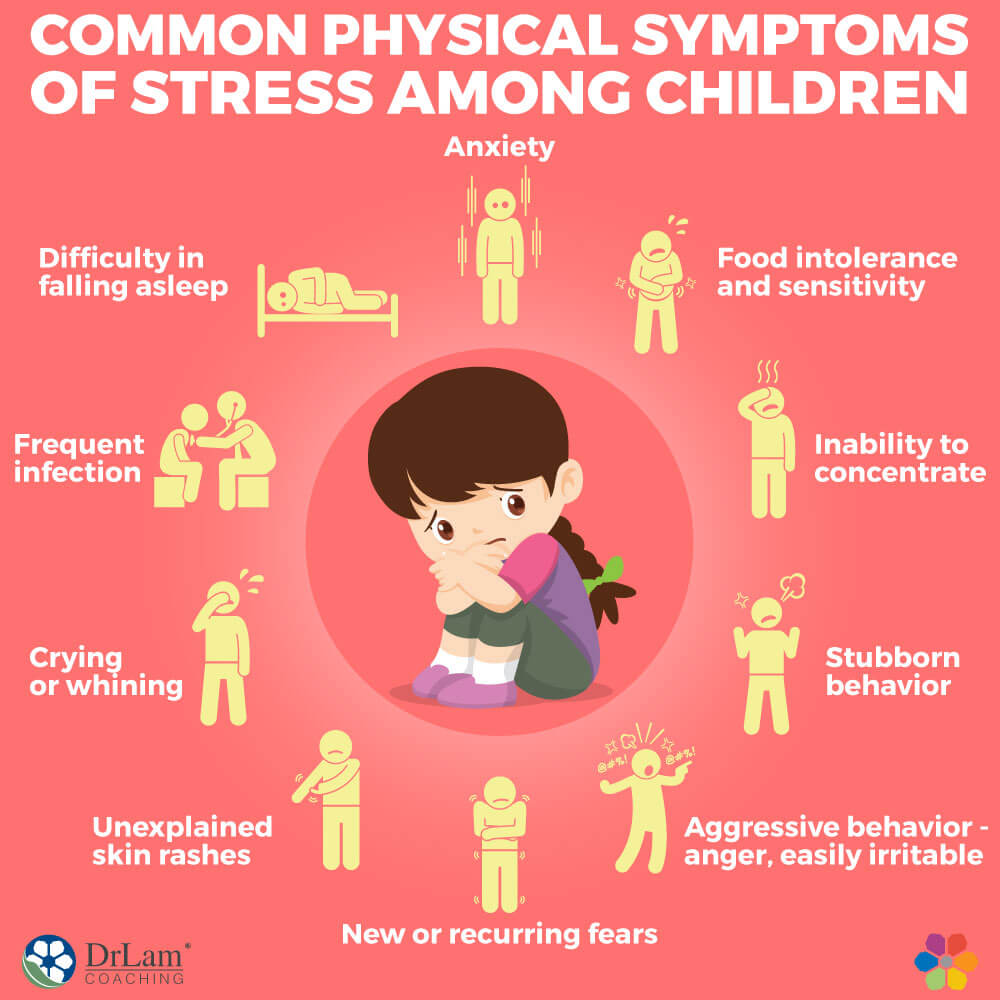
The effects of stress on children's health can manifest in a number of ways. Some of the common physical symptoms of stress in children include:
At the same time, stress also affects a child's behavior and mental state. Such effects of stress on children's health include:
What many may not realize is that all these symptoms indicate a weakened adrenal system. And while children are known to be typically energetic and resilient, having weak adrenals means they won't be able to cope with the effects of chronic stress.
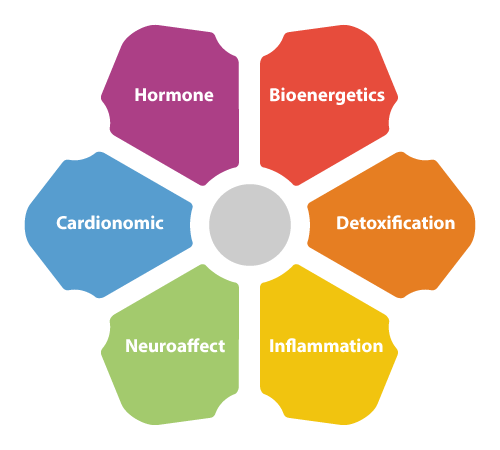 When dealing with stress, the human body often relies on its NeuroEndoMetabolic (NEM) stress response system. The NEM stress response system is comprised of six organ or system circuits. These include the Hormone, Metabolism, Neuroaffective, Cardionomic, Inflammation, and Detoxification Circuits.
When dealing with stress, the human body often relies on its NeuroEndoMetabolic (NEM) stress response system. The NEM stress response system is comprised of six organ or system circuits. These include the Hormone, Metabolism, Neuroaffective, Cardionomic, Inflammation, and Detoxification Circuits.
Just like in adults, a child's body relies on the adrenal glands in the hormone circuit to produce stress hormones to address stress. Among these hormones is cortisol, the body's primary stress hormone. Typically, the adrenals would increase their cortisol production in the presence of a stressor. However, once there's no stress, then the adrenals and all components of the NEM stress response system return to normal.
In the case of chronic stress, the NEM stress response system is forced to work continuously, which exhausts the body. As for the adrenal glands, they continue producing cortisol until they can no longer cope with the body's demands. Because of this, the child's body suffers from a significant hormonal imbalance. This, in turn, triggers Adrenal Fatigue Syndrome (AFS).
When a child suffers from AFS, he or she can experience symptoms such as:
At the same time, because cortisol suppresses the body's immune system, a child suffering from adrenal fatigue also suffers from poor immune function. Because of this, he or she may become more prone to suffering from a number of conditions. This includes something as simple as a common cold. And as a child becomes sicker, he or she may end up becoming socially withdrawn. This contributes to depression, increased anxiety, and further stress.
There are also children who already suffer from adrenal problems. This means that they are already experiencing a hormonal imbalance. Some of the known adrenal conditions that can affect children's health include:
Addison's disease is a condition that occurs when the adrenals are not capable of producing adequate amounts of cortisol and other hormones such as aldosterone. Because of this, the body ends up with low sodium levels and elevated potassium levels. There is also an extreme sensitivity to insulin. Moreover, a child suffering from this disease may experience symptoms such as fatigue, muscle weakness, nausea, muscle aches, vomiting, diarrhea, loss of appetite, and intolerance to cold.
 Unlike Addison's disease, Cushing's syndrome is a condition that is characterized by having overactive adrenal glands. In this case, the adrenals end up making too much of the hormone cortisol. As a result, a child may suffer from symptoms such as high blood pressure, muscle weakness, slowing growth rate, increased blood sugar level, acne, depression, moodiness, and obesity.
Unlike Addison's disease, Cushing's syndrome is a condition that is characterized by having overactive adrenal glands. In this case, the adrenals end up making too much of the hormone cortisol. As a result, a child may suffer from symptoms such as high blood pressure, muscle weakness, slowing growth rate, increased blood sugar level, acne, depression, moodiness, and obesity.
Congenital adrenal hyperplasia is a rare inherited disorder. It's characterized by a deficiency in one of the enzymes that the body needs to make specific hormones. Because of this, the adrenals would not be able to produce cortisol to help a child's body respond to stress. Sometimes it also leads to infant girls developing ambiguous genitalia.
Hyperaldosteronism is a condition that results in the body producing excessive amounts of the hormone aldosterone. This hormone affects the balance of potassium and sodium in the body. Because of this, a child may suffer from headaches, muscle cramping, general weakness, high blood pressure, and frequent urination.
Pediatric adrenal carcinomas (or cancer of the adrenal gland) is a rare condition that can occur in children five years and older. This condition involves symptoms such as stunted growth, obesity, big cheeks, and a flushed round face. At the same time, a child suffering from this disease may also have a hump on the back, below the neck.
Although not cancerous, pheochromocytoma is a condition that involves a tumor in the adrenal gland tissue. Because of this, the adrenals may excrete an excessive amount of adrenaline. Symptoms of pediatric pheochromocytoma include constipation, panic attacks, anxiety, abdominal pain, sweating, unexplained weight loss, blurry vision, headaches, and an increased heart rate.
With a pre-existing adrenal condition, a child's body becomes less able to cope with stress. In these cases, any external stressor can worsen the stress that they are already experiencing. As a result, they experience further hormonal imbalance. This also contributes to adrenal fatigue, which further worsens their health.
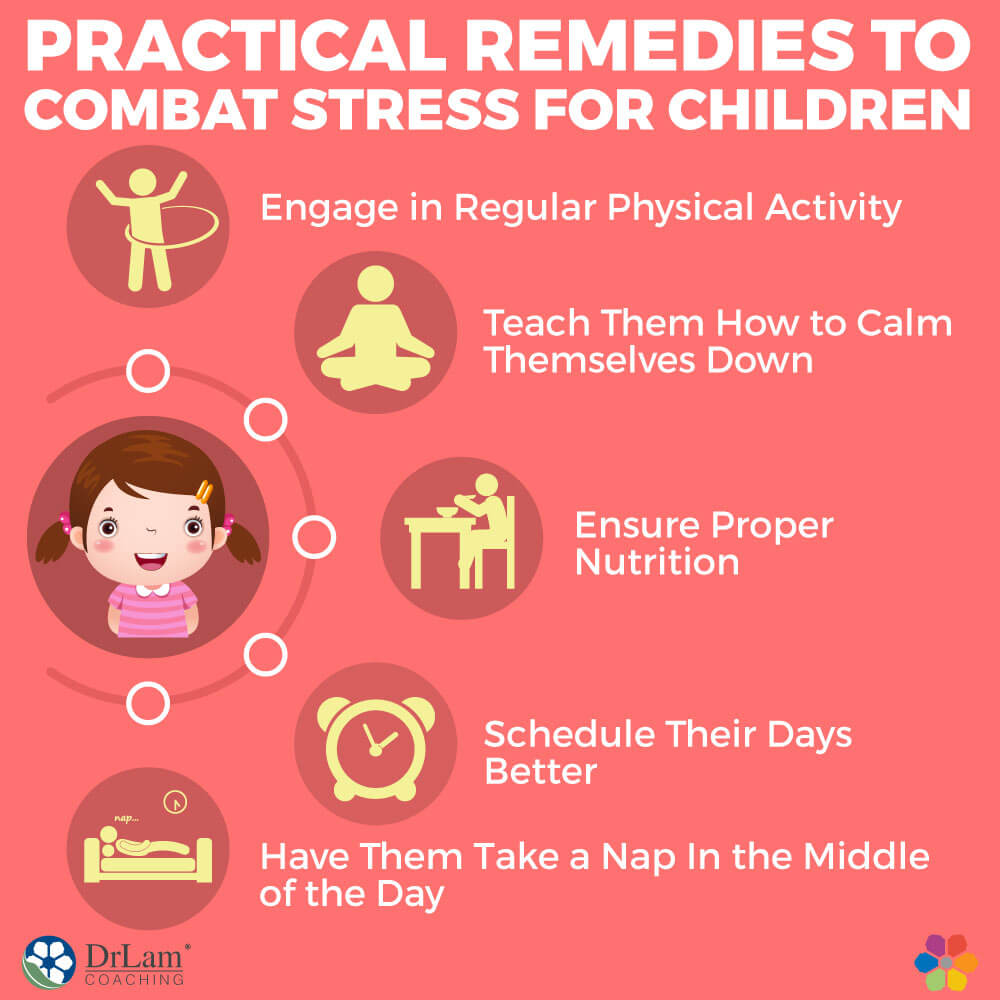
In order to relieve a child of the symptoms of adrenal fatigue, it is important to first help them combat stress. There are a number of practical remedies that you can try. However, if your child is suffering from a pre-existing condition or physical disability, it is always recommended to consult with their medical practitioner first. This is because certain remedies may worsen a child's state and cause further stress.
Here are a few ways to improve children's health and lessen their stress levels:
Many experts agree that one of the best ways to improve children's health and combat stress is through regular physical activity. Physical activity has been found to help in managing a child's anxiety and depression. At the same time, exercise also helps the body release more endorphins, which can help make a child feel happier. Moreover, endorphins can also help a child sleep better. Meanwhile, physical activity has also been linked to better cognitive skills and greater self-esteem among children.
When it comes to giving your children playtime, it's also important to make sure that there is no end goal or competition involved. Allow them to enjoy play naturally so that they don't feel any sort of stress from the activity.
Relaxation techniques have been known to help reduce anxiety and stress among children. Exercises such as deep breathing can calm children and make them feel more at ease. Once they feel more relaxed, they can deal better with negative emotions such as frustration, anger, and sadness. At the same time, they can also cope with stressful situations much better.
One of the best ways to combat stress and encourage adrenal recovery is by eating nutritiously. Remove junk food and sugary treats from your child's daily diet. Instead, feed them more leafy greens, whole grains, and low-glycemic fruits. At the same time, make sure that they stay hydrated throughout the day.
Children can feel stressed due to the rigors of their daily schedule. Aside from academic work, children also find themselves in various extracurricular activities. At the same time, parents may also feel the need to schedule extra lessons or tutorial sessions for their children after school and even during weekends. Because of this, a child doesn't have much opportunity to get proper rest. At the same time, they feel stressed out about having to keep up with everything.
To avoid this, make sure you schedule your child's day in such a way that he or she doesn't feel overwhelmed. Don't sign them up for too many activities. Always talk to them about their preferred extracurricular activities.
Having your child take a nap for around 90 minutes during the afternoon helps rejuvenate his/her body. Because of this, they would have more energy to face the rest of the day. At the same time, they would also have a more positive attitude towards dealing with stress.
Chronic stress allows harmful toxins to easily enter the body. With chronic stress, the body suffers from low-grade inflammation which increases the permeability of the gut lining. This, in turn, allows toxins to penetrate the gut. As this happens, the body suffers from a depression in the central nervous system.
When your child is already suffering from stress, it is critical to keep his or her environment as toxin-free as possible. There are several ways to easily detox your home. For a start, make it a habit to leave your shoes at the door. This keeps out about 80 percent of the debris that you tend to bring in. This may include lead dust, pesticides, and sealant. It also helps to crack open a window when possible to let in fresh outdoor air.
Avoid household cleaning products that are full of harmful pesticides that can further stress the body. At the same time, make sure that the plastic containers you use at home do not contain the dangerous chemical bisphenol-A (BPA).
Today's society can be characterized by a dependency on electronic gadgets and social media. However, they are also a major daily stressor. And just like adults, children feel the pressure to keep up with their peers based on the updates they see online.
To prevent your children from becoming stressed, encourage them to disconnect several times a day. Instead of browsing on their phone, laptop or tablet, have them go outside and play. It's also a good idea to ban gadgets during meal times.
 Aside from the practical remedies, there are also several children's health supplements that promote stress relief. What's more, these supplements also contain several nutrients. These nutrients are vital to strengthen the body and enhance the immune function.
Aside from the practical remedies, there are also several children's health supplements that promote stress relief. What's more, these supplements also contain several nutrients. These nutrients are vital to strengthen the body and enhance the immune function.
A diet rich in vitamin B is believed to help lower one's anxiety levels. This would be helpful if your child is facing a lot of pressure at school.
Magnesium has long been associated with better calcium absorption, bone health, and relief from migraine headaches. Magnesium is also known to effectively lower one's anxiety levels.
Omega 3 fatty acids have always been linked to improved mental health. In fact, it is known to alleviate anxiety and depression. When giving your child this type of supplement, make sure you follow the appropriate dosage. However, this is a nutrient naturally found in algae or fish. That means that some children may have an allergy or intolerance to the supplement.
Prebiotics refer to a type of dietary fiber that feeds the friendly bacteria in the gut. With the help of prebiotics, the gut can be stronger in resisting toxins trying to penetrate it. This would then stop the depression of the central nervous system, which occurs during adrenal fatigue.
Probiotics refer to the good bacteria, that help to maintain one's gut flora. Moreover, probiotics can help protect your child against a host of diseases by strengthening his or her immune system. Experts also believe that probiotics are an effective treatment against depression.
Chamomile has long been known for its calming effects. Hence, it is great for soothing a child who is feeling anxious, over-energized or exhausted.
Lemon balm is an herb that is known to help relieve anxiety. At the same time, this herb possesses neuroprotective properties, which also preserves the brain's functions.
Valerian is one herb that is known to reduce one's cortisol levels. Hence, it can help a child get a more restful sleep at night.
Aside from children's health supplements, there are also a number of healthy foods that are known to promote adrenal recovery. However, if you plan to give anything new to your child, it's best to consult with his/her pediatrician first. This way, you can rule any possible food intolerance or allergy issues, which can induce further stress. Let's consider a few foods that promote better adrenal function:
 Whole grains are rich in dietary fiber, which can help a child feel full for much longer. And since his or her body is satiated, there is a reduced tendency to snack on unhealthy sugary treats. At the same time, a whole grains diet has also been associated with reduced stress levels, stable blood pressure, and increased serotonin levels.
Whole grains are rich in dietary fiber, which can help a child feel full for much longer. And since his or her body is satiated, there is a reduced tendency to snack on unhealthy sugary treats. At the same time, a whole grains diet has also been associated with reduced stress levels, stable blood pressure, and increased serotonin levels.
Black beans are rich in fiber and protein. Moreover, it is a good source of vitamins and minerals such as vitamin B6, magnesium, calcium, zinc, manganese, and potassium. Even better, black beans are known to relax the nervous system and balance the body's stress hormones.
Leafy greens are rich sources of both vitamin C and magnesium. It can provide energy and lower inflammation in the body. Not only that, but leafy greens can also help lower your blood sugar levels during meals. That means children would not suffer from sudden blood sugar spikes, which forces the adrenals to produce more cortisol.
Avocados contain several important vitamins such as B6, C, E, and K. Moreover, they are also rich in other nutrients, including magnesium, potassium, niacin, folate, pantothenic acid, omega-3 fatty acids, lutein, and beta-carotene.
Unrefined pink sea salt is one of the nutritionally dense foods available. In fact, it is said to contain as much as 84 trace minerals that the body needs to feel energized. At the same time, this salt also helps relieve headaches. Try to sprinkle some pink sea salt on your child's breakfast oatmeal.
Seeds such as flax, sunflower, sesame, and pumpkin are rich sources of magnesium. Hence, it is a good idea to include any of these in your child's snack options. Moreover, you can add it to their trail mix.
As you may know, having a nutritious diet is key to improving your child's health against stress and adrenal fatigue. That said, children are typically picky eaters. So, they may not readily eat certain healthy foods.
Fortunately, there are ways to turn healthy foods into colorful dishes that can entice children. Here are some recipes which support children's health and promote adrenal healing:
Try making any of these recipes to help improve your child's health and promote adrenal healing at home. At the same time, it is also a good idea to get your children involved in preparing these dishes so they can also become better-educated about proper nutrition.
 Stress can have a serious impact on children's health. Even worse, it puts them at a greater risk for adrenal fatigue. If you believe your child is already showing signs of stress, it is a good idea to seek professional help as soon as possible. This way, your child's physical, behavioral, and emotional symptoms can be relieved. Learning how to cope effectively with stress at an early age is important. This will ensure that they are less likely to become overly stressed when they reach adulthood.
Stress can have a serious impact on children's health. Even worse, it puts them at a greater risk for adrenal fatigue. If you believe your child is already showing signs of stress, it is a good idea to seek professional help as soon as possible. This way, your child's physical, behavioral, and emotional symptoms can be relieved. Learning how to cope effectively with stress at an early age is important. This will ensure that they are less likely to become overly stressed when they reach adulthood.
© Copyright 2021 Michael Lam, M.D. All Rights Reserved.
When people think of stress, they assume that it is a problem that only affects adults. Unfortunately, children's health can also become affected by stress. That's because children face stressors on a regular basis. And when they experience chronic stress, they can also suffer from adrenal fatigue.
